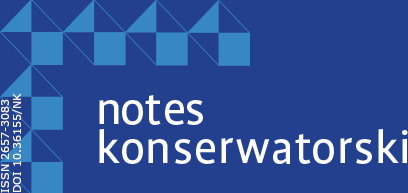Etyka wydawnicza / Publication Ethics
Rocznik naukowy „Notes Konserwatorski” utrzymuje najwyższe standardy etyki wydawniczej w zgodności z wytycznymi COPE (Committee on Publication Ethics): COPE Code of Conduct for Journal Publishers, COPE Code of Conduct for Journal Editors i COPE Best Practice Guidelines. Dane osobowe autorów, recenzentów i innych współpracowników wydawcy podlegają ochronie zgodnie z przepisami RODO.
AUTORZY
Autorzy zobowiązani są do przesyłania artykułów stworzonych przez nich samodzielnie i całości (zapobieganie plagiatowi), które nie zostały przekazane żadnemu innemu wydawcy (zapobieganie autoplagiatowi). Nie wolno im również stosować praktyk takich jak ghost authorship oraz guest authorship – osoby zgłaszające swoje teksty do publikacji muszą w sposób wyraźny i dokładny wskazać rzeczywistych autorów prac oraz określić zakres i charakter ich wkładu.
Autorzy winni prezentować swoje ustalenia w sposób klarowny i uczciwy oraz unikać manipulacji danymi, a także ich fałszowania. Powinni korzystać z aktualnych źródeł i precyzyjnie opisywać metodologię badań, aby uzyskane przez nich wyniki były zrozumiałe dla innych badaczy i weryfikowalne.
Autorzy powinni unikać wszelkich stwierdzeń, które mogłyby godzić w reputację jakichkolwiek osób lub instytucji, chyba że ich zgodność z faktami można udowodnić, a ich ujawnienie w istotny sposób wiąże się z problematyką tekstu. Autorzy są zobowiązani stosować się do instrukcji dla autorów.
REDAKCJA I WYDAWCA
Dla zapobiegania plagiatowi i autoplagiatowi redakcja wykorzystuje wszystkie dostępne metody, w tym specjalistyczne oprogramowanie (Antyplagiat). Jeżeli po wstępnej ocenie artykułu pojawiają się wątpliwości co do autorstwa lub oryginalności tekstu, autorzy proszeni są o wyjaśnienia. W przypadku potwierdzenia się podejrzeń (auto)plagiatu lub innych naruszeń etyki artykuł zostaje odrzucony.
Wydawca zapewnia profesjonalną redakcję artykułów dopuszczonych do publikacji. Redakcja i wydawca „Notesu Konserwatorskiego” gwarantują, że bez wyraźnej zgody autorów żadne niepublikowane informacje zawarte w nadesłanym rękopisie nie zostaną ujawnione osobom trzecim, to jest takim, które nie są bezpośrednio i oficjalnie zaangażowane w proces publikacji.
RECENZENCI
Po zgłoszeniu artykułu, jego wstępnej ocenie oraz weryfikacji antyplagiatowej i zgodności z profilem „Notesu Konserwatorskiego” redakcja poddaje go zewnętrznym podwójnie ślepym recenzjom (double-blind peer review).
Recenzenci stosują się do zasad określonych w COPE Ethical Guidelines for Peer Reviewers. Ich powinności i cały proces recenzowania opisano w zakładce ZASADY RECENZOWANIA.
______
PUBLISHING ETHICS AND MALPRACTICE STATEMENT
The academic journal Notes Konserwatorski maintains top standards of publication ethics and supports ethical research practices according to the guidelines of COPE (Committee on Publication Ethics). It follows the guidelines outlined in the COPE Code of Conduct for Journal Publishers, COPE Code of Conduct for Journal Editors, and COPE Best Practice Guidelines. Personal data of the authors, reviewers and other co-workers of the publisher are protected under the provisions of the General Data Protection Regulation of the European Union (2016/679).
AUTHORS
Authors are supposed to submit original studies they created personally and in their entirety (prevention of plagiarism), and that have not been submitted to any other publisher (prevention of autoplagiarism). Contributors shall also avoid ghost authorship, as well as guest or gift authorship – individuals submitting their texts for publication should clearly and accurately name their actual authors, and determine the extent and character of their contribution.
Authors should present their results clearly, honestly, and without data falsification or manipulation. They need to use valid and up-to-date references, and describe their methods accurately so that their findings can be understood and confirmed by other researchers.
Contributors are supposed to avoid formulating any statements that might harm the reputation of any individuals or organizations, unless they can be proved to be factual and they disclosure is necessary and pertinent to the subject of the text.
EDITORS AND PUBLISHER
To prevent plagiarism and autoplagiarism, the publisher uses all available methods, including specialist software (Antyplagiat). If the first evaluation of the submitted manuscript raises any doubts as to the authorship or originality of the text, its authors are asked for explanation. If the (auto)plagiarism suspicions or other unethical irregularities should be confirmed, the article is immediately rejected.
The publisher ensures professional text editing of the articles approved for publication. The editors and the publisher of the Notes Konserwatorski guarantee that no unpublished information contained in a submitted manuscript should be disclosed to a third party that is not overtly and directly involved in the publication process without the authors’ explicit consent.
REVIEWERS
After the submission of a manuscript, its preliminary assessment, confirmation of its authorship and conformity with the profile of Notes Konserwatorski, the editorial board subjects it to external double-blind peer reviews.
Our reviewers are required to work according to the COPE Ethical Guidelines for Peer Reviewers. The responsibilities of the reviewers and the entire reviewing process are described in the tab ZASADY RECENZOWANIA (English version below).

